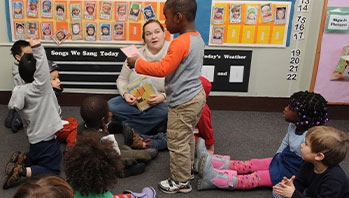MA Standards:
English Language Arts/Speaking and Listening/SL.PK.MA.1a Observe and use appropriate ways of interacting in a group (e.g., taking turns in talking, listening to peers, waiting to speak until another person is finished talking, asking questions and waiting for an answer, gaining the floor in appropriate ways).
English Language Arts/Foundational Skills/RF.PK.MA.2 With guidance and support, demonstrate understanding of spoken words, syllables, and sounds (phonemes).
Head Start Outcomes:
Social Emotional Development/Self-Regulation Follows simple rules, routines, and directions.
Language Development/Receptive Language Attends to language during conversations, songs, stories, or other learning experiences.
Literacy Knowledge/Phonological Awareness Identifies and discriminates between separate syllables in words.
PreK Learning Guidelines:
English Language Arts/Language 1 Observe and use appropriate ways of interacting in a group (taking turns in talking; listening to peers; waiting until someone is finished; asking questions and waiting for an answer; gaining the floor in appropriate ways).
English Language Arts/Reading and Literature 12 Listen to, recite, sing, and dramatize a variety of age-appropriate literature.
English Language Arts/Reading and Literature 8 Listen to, identify, and manipulate language sounds to develop auditory discrimination and phonemic awareness.
Word Play: Tell Me What You Hear (/f/)

© Commonwealth of Massachusetts, Department of Early Education and Care (Jennifer Waddell photographer). All rights reserved.
ELA Focus Skills: Phonological Awareness (Ending Sounds)
Tell children they are going to review the /f/ sound. Tell children you want them to recite a poem with you that has different words that begin with the letter sound /f/. Recite the poem once and repeat as children join in.
Tell Me What You Hear
Recite this chant with words that end with the target sound.
Listen, listen, loud and clear (cup your hands to one ear)
What’s the first sound that you hear?
Farm, fig, fruit, flower! (emphasize the /f/ sound)
Tell me, tell me, what you hear! (children say the /f/ sound)
>Source for chant: Mississippi Early Learning Guidelines for Four-Year Old Children, Mississippi Department of Education, 2006.
Take It Further: You may want to have children suggest other words that begin or end with the letter sound /f/ and recite the poem again.
Educator Tip: Guided and independent Letter, Sound, and Word practice continues to take place in center activities. It is helpful to set up the literacy center immediately after the direct instruction and repeat instruction before children work in the literacy center identifying letters.
